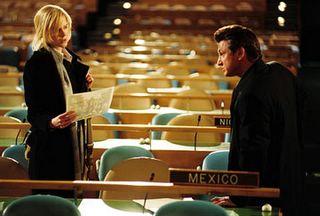The Interpreter
Sydney Pollack's been making pretty good movies (with the occasional really good movie) for a long time now. So, let's face it, the guy knows what he's doing. Before he went really astray in the 90's, and produced such forgettable piffle as Random Hearts and Sabrina, his films always had, at the very least, a sturdy foundation of professionalism and taste. What they lack in ingenuity and dazzle, they make up for in reliability and sound craftsmanship.
The Interpreter is a satisfying and well-made political thriller of this style. It's unexciting, and frequently predictable, but it's also handsome, occasionally sharp and it does contain a few terrifically suspenseful, first-rate sequences. Though I can't say I loved the film, or will likely ever feel the need to revisit its modest pleasures, it's still Pollack's best work since Out of Africa in 1985, and a decidedly above-average mainstream entertainment.
The movie would come off far better if Pollack didn't make some rudimentary mistakes. His film has two protagonists: one is a UN interpreter from the fictional African nation of Matobo (Nicole Kidman), the other a hard-boiled, no-nonsense Secret Service agent (Sean Penn). I think Pollack intends to explore these character's duality - they are drawn to one another even though they represent opposite perspectives. But the device of cutting between these two perspectives really undercuts all of the suspense Pollack needs to build in the film's first half.
To explain, I need to give you a bit more of the story. Kidman's African emigre, Silvia, has overheard two men on the floor of the UN after hours discussing a plot to kill a visiting African dignitary from her home country. Penn's Secret Service agent, Keller, at first doubts the veracity of her story - after all, how likely is it that two men would be discussing such a plan in the UN itself when coincidentally a woman who speaks their obscure African dialect is in the translation booth and can hear them perfectly?
The problem is, we have seen Silvia in the translation booth actually overhearing this conversation. So we know it has really happened (unless Pollack is pulling some sort of false-flashback Usual Suspects trick, though this really isn't that kind of movie). That basically invalidates the entire first 30 minutes of the movie. How are we supposed to invest in Keller's investigation when we know from minute one that it's misguided?
Pollack shortchanges his suspense plotting throughout the entire film in this manner. In a later sequence, Silvia turns on the shower in order to fool Keller's surveillance team, allowing her to sneak out. Then, we see an assassin enter Silvia's apartment intending to kill her. He unloads a few rounds into the shower before Keller gets the drop on him and takes him out. Keller then opens the shower door and discovers...that Silvia's not in there.
But we already knew that, so the moment carries no surprise. Why on Earth does Pollack include that shot of Kidman turning on the shower and then skulking away? If he had just left that shot out, he might have a chance at actually fooling someone.
I'm genuinely befuddled, because in all other ways, the movie is astutely directed. Cinematographer Darius Khondji does really impeccable work here (he's also responsible for the David Fincher's Seven and Panic Room, and Jean-Pierre Jeunet's visionary Delicatessen and City of Lost Children.) And, as I said, everything is just so confidently shot and edited. There's a visual sophistication and a grace in the storytelling that you only get with seasoned, veteran directors.
Let me give you one example, a truly wonderful sequence reminiscent of Pollack's best film (at least, best film that I've seen), Three Days of the Condor. Silvia walks down a dark street to her home. She hears footsteps behind her. She turns around - there's a man walking quickly, keeping up with her but not passing her. She moves faster, eventually breaking into a run.
We zoom back and see that there is, in fact, a man following her. Then he hears a voice in his earpiece, telling him not to tail Silvia so close. So it's okay, he's a Secret Service agent, just watching over her.
Then, when we think the sequence is over, we quickly pan to another figure in a parked car across the street. It's an assassin who's been lying in wait the entire time.
That's just great stuff right there, a classic reversal. You get nervous, you calm down, and then, BOOM, you're nervous again. When will Pollack make a whole movie that's as good as that scene?
This is the first movie ever permitted to shoot inside the halls of the U.N., so it carries with it something of an undue sense of decorum and solemnity. It's filled with finely-sketched little details designed to enhance the accuracy. Even the fake African dialect spoken by Kidman and her countrymen was created specifically for the film. But in the end, this seriousness and focus serves an unworthy story, a potboiler designed around a pretty silly conspiracy that, once revealed, doesn't hold together particularly well.

No comments:
Post a Comment